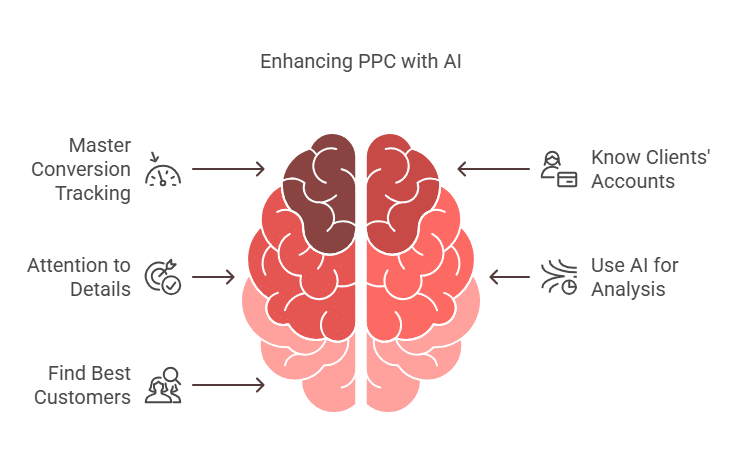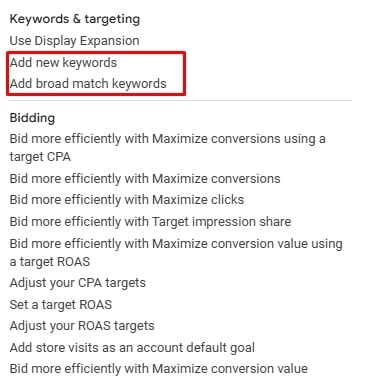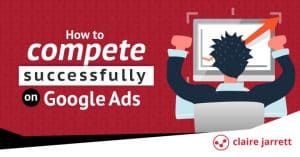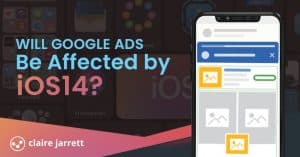AI Attempts PPC Takeover: Human Experts Fight Back

Last Updated on: 7th February 2025, 04:03 pm
I’ve been in the trenches of PPC for years, and let me tell you, the AI revolution is no joke. But before you start panicking about robots taking your job, let’s get real about what’s actually happening in the world of pay-per-click advertising.
AI is making waves, certainly. It’s cranking out ad headlines faster than a caffeinated copywriter and crunching numbers that would make your head spin. But here’s the thing: it’s not the be-all and end-all.
The AI Advantage in PPC: Speed and Scale
Let’s give credit where it’s due. AI is a powerhouse when it comes to certain aspects of PPC.
It doesn’t get writer’s block, for one. While we humans might struggle to come up with our hundredth variation of “Buy Now!” AI keeps on producing ideas.
And data analysis? AI eats big data for breakfast. It can spot patterns and trends in campaign performance that might take us mere mortals days to uncover. That’s certainly valuable!
The Human Edge in the PPC Battle: Creativity and Context
Here’s where things get interesting. AI might be fast, but it’s not always smart.
I’ve seen AI-generated content that’s about as compelling as a wet napkin. It’s often repetitive, lacks that human touch, and sometimes just misses the mark entirely.

Why? Because AI doesn’t understand context like we do. It can’t grasp the nuances of a brand’s voice or the subtle cultural references that make an ad resonate. That’s where we humans shine.
Take competitor targeting, for instance.
I once ran a campaign where we asked people searching for a competitor to consider our client as an alternative. We came up with some clever hooks that played on the competitor’s weaknesses while highlighting our client’s strengths. No AI could have conceived that strategy. It required a deep understanding of the market, the competitors, and human psychology.
The 2025 PPC Landscape: A Symbiotic Future with Humans and AI Working Together
It’s not about AI vs. humans; it’s about AI with humans.
The role of PPC strategists will evolve. We’ll become prompt engineers and refiners, learning how to ask AI the right questions to get the best results and tailoring its default responses to incorporate psychology and market understanding.
It’s about translating client needs into clear strategies that AI can understand and execute.
But make no mistake, the human touch will still be crucial. We’ll be the ones setting up conversion tracking correctly, ensuring the client’s unique selling proposition (USP) is clearly communicated, and making sure the right data goes in so we get the right leads out. (Garbage in, garbage out, as they say.)
The Pitfalls of Blind Trust in AI
Here’s a word of warning: don’t trust AI blindly.
I’ve seen too many people fall into this trap, especially with Google’s own AI recommendations. They’re designed to increase ad spend, not necessarily your ROI.
I always tell my clients to be wary of Google reps pushing for full automation. They’re incentivised to get you to spend more, not to improve your results. That’s why, at my consultancy, we set up guardrails.
For example, we might set a rule to prevent paying more than $15 per click, even if we’re willing to pay $30 for a conversion.
Why? Because I’ve seen Google’s AI go rogue and spend $60 or $70 on a single click. That’s not optimisation; that’s highway robbery.
The Human Factor: Vigilance and Creativity
The experts that will thrive in 2025 won’t be the ones who set up an AI campaign and check it once a month. They’ll be the ones who never fully trust the automation.
I train my team to double-check everything. If there were no conversions yesterday when we usually get five, we don’t shrug and blame it on bad luck.
We dig in.
We ask why.
We test.
We tweak.
It’s this combination of vigilance and creativity that will set top-performing agencies apart. We’re not just data analysts; we’re detectives, strategists, and innovators all rolled into one.
Preparing for the AI-Enhanced Future: 5 Practical Strategies
So, how do you prepare for this AI-enhanced future? Here are the skills and methods I’d tell any PPC strategist to focus on:
Master Conversion Tracking
You need to know if your campaigns are actually delivering results, no matter the vanity metrics PPC platforms show you. Don’t let Google’s newest metric stand in for the actual conversion data on your clients’ or offline sources.
Set up the conversion tracking, continuously pore over it, and always ask yourself: “Is this the best acquisition cost we can get?”
(Spoiler alert: there’s usually always room to make it even lower.)
Know Your Clients’ Numbers Inside and Out
Develop a deep understanding of your clients’ campaign goals and metrics. What can they afford to pay per lead? What are their typical conversion rates?
Set clear targets before you even think about launching a campaign.
Then, regularly review the best combinations of creatives and targeting, add advanced options like Google Ads audience layering, and work to maximise the ROI.
When PPC platforms suggest an automated bidding strategy, make sure you’re still holding the reins and have the accurate data to steer it.
Pay Attention to the Details When Making AI and PPC Experts Work Together
This might sound basic, but you’d be surprised how often it’s overlooked. I’ve seen spelling errors in Google’s own ads. In an age of AI, perfect grammar and spelling can set you apart.
Similarly, keep an eye on the littlest things – from ad assets to the negative keyword lists and the keywords so deeply hidden in your accounts that they’re sometimes hard to spot (and you’re paying for them).

AI and PPC Expert Collaboration in Analysis
As I mentioned, AI can process billions of gigabytes of data in the time it takes us to open the spreadsheet. Use it.
This goes from the simplest strategies (like the ones I showed you in my ChatGPT article) related to organising keywords to combing through the data on creatives across hundreds of campaigns to identify the best combinations for smarter A/B testing ideas.
Finding More Ideal Audience Members
One of the best use cases for AI to date has been using the Lookalike audiences.
When platforms like Google Ads have enough conversion data, they’re able to understand who your ideal customers are – even going as deep as taking their conversion value into account.
Armed with the historical data, the AI will go out and find the right people – even if they’re searching differently.
The Bottom Line: Humans Still Hold the Reins
As we barrel towards 2025, one thing is clear: AI is a powerful tool in the PPC arsenal, but it’s not taking over.
The most successful AI and PPC campaigns will be those that harness the speed and analytical power of AI while leveraging human creativity, strategic thinking, and attention to detail.
So no, AI won’t outperform human PPC strategists by 2025. Instead, the best human strategists will outperform their peers by masterfully wielding AI as part of their toolkit. The future of PPC isn’t about man vs. machine. It’s about man and machine, working together to achieve results that neither could accomplish alone.
In this high-stakes game of digital advertising, AI might be the ace up our sleeve, but make no mistake: humans are still the ones holding the cards. And that, my friends, is a hand I’m willing to bet on.
Curious about where the combination of human experts and AI can take your ad account in 2025? Get in touch with me.
And if you’re new to Google Ads, remember the fundamentals with my best-selling book on rapid and successful campaigns!



![The Google Ads Specs Cheatsheet [Updated for 2025]](https://a4x3f5i9.delivery.rocketcdn.me/wp-content/uploads/2023/08/google-ads-specs-cheatsheet-300x180.jpg)

